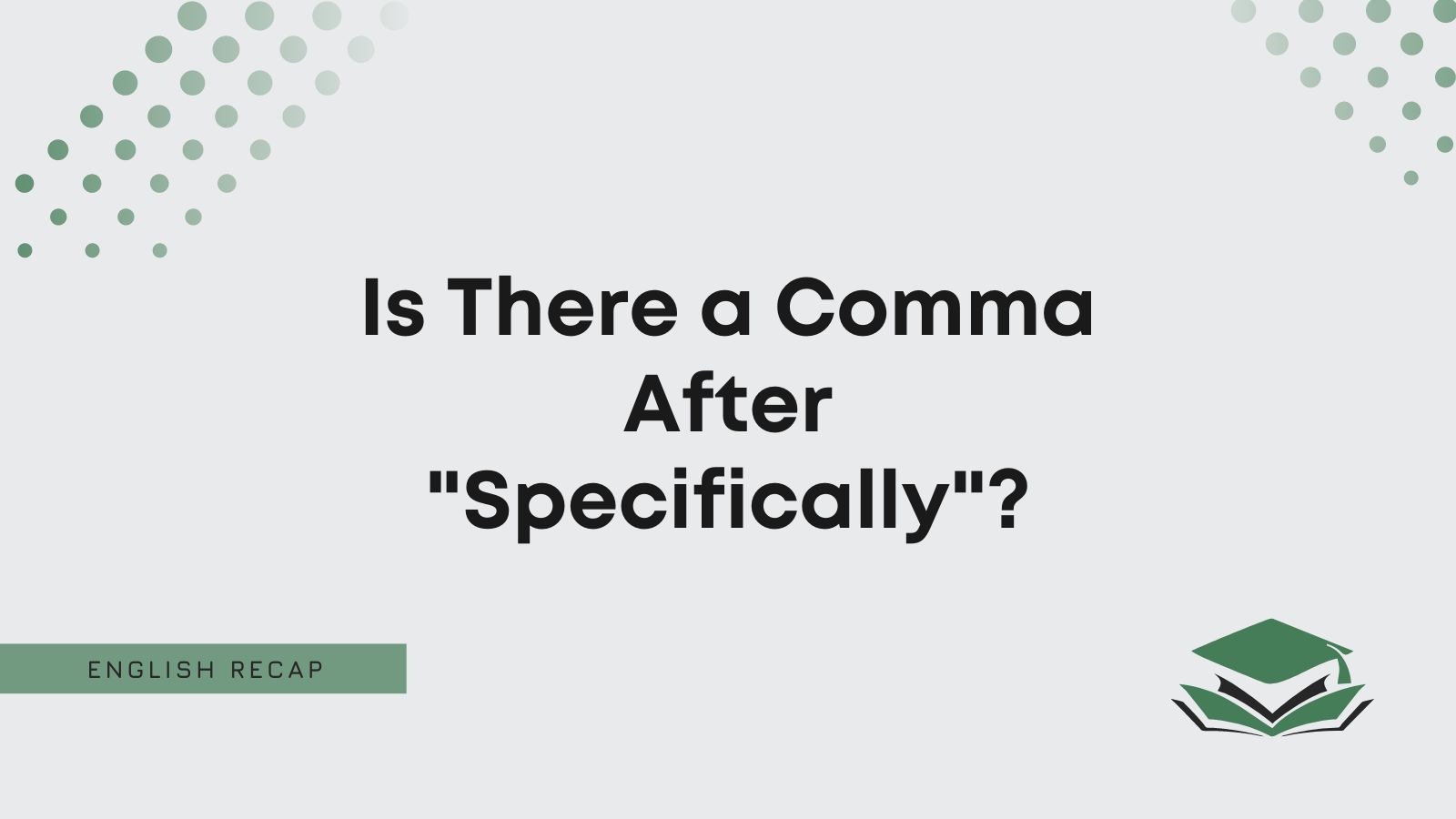Rule 1: You need to put a comma after “specifically” when it is the first word of a sentence.
- Correct: I need some food. Specifically, I want a big juicy steak.
- Incorrect: I need some food. Specifically I want a big juicy steak.
Rule 2: You can put a comma after “specifically” before a dependent clause; however, it is not essential.
Furthermore, you must place a comma before “specifically” in these cases.
- Correct: She is interested in studying law, specifically, family law.
- Correct: She is interested in studying law, specifically family law.
Rule 3: You need to put a comma after “specifically” when an independent clause appears straight after it.
- Correct: She is considering relocating; specifically, she wants to live near the coast.
- Incorrect: She is considering relocating, specifically, she wants to live near the coast.
- Incorrect: She is considering relocating, specifically she wants to live near the coast.
Rule 4: Do not use a comma with “specifically” when it forms an essential part of the sentence.
This means that you cannot remove the word without changing the meaning.
- Correct: She specifically said to meet at her house, but when we got there, it was empty.
- Incorrect: She specifically, said to meet at her house, but when we got there, it was empty.
- Incorrect: She, specifically, said to meet at her house, but when we got there, it was empty.
Perhaps you still have doubts about when to use commas with the term “specifically.” If so, you should read the rest of the article, where we explain the rules in more detail.
We’ll show many example sentences to help clear out your doubts about how to use “specifically” in a sentence.
When to Use a Comma After “Specifically”
Please check Rules 1, 2, and 3 when deciding whether to put a comma after “specifically.”
Rule 1: Use a comma after “specifically” at the beginning of a sentence.
In this position, “specifically” refers to information in the previous sentence.
Here are two great examples:
- The Republicans made gains in the mid-term elections. Specifically, they won several swing states.
- He is a plastic surgeon. Specifically, he performs facial reconstruction.
Rule 2: You can use a comma after “specifically” when it comes before a dependent clause.
However, it is unnecessary, and you can also omit it.
By including the comma after, you are creating an extra pause before the final clause. Whether you put this pause or not depends on whether you want to emphasize the last part.
Have a look at these example sentences:
- We plan to travel to Africa, specifically, Kenya and Botswana.
- We plan to travel to Africa, specifically Kenya and Botswana.
Rule 3: You should always use a comma after “specifically” when an independent clause comes after it.
In this position, “specifically” connects two independent clauses and therefore needs a semicolon before it and a comma after.
You can see this context in the example sentences below:
- We are having a meeting tomorrow; specifically, I want to explain the recruitment strategy to you.
- He was in the military before he became a carpenter; specifically, he served in Iraq for two years.
You can also add the word “more” before “specifically,” so it becomes “more specifically.” However, there is no change in meaning.
Review this example to see what we mean:
- We are taking a trip; more specifically, we are going to Florida for two weeks.
Now, let’s see when you should avoid using a comma with “specifically.”
When to Avoid a Comma With “Specifically”
To see when to avoid commas with “specifically,” please check Rule 4.
Rule 4: You shouldn’t use a comma after “specifically” when it is an essential part of a clause or sentence.
In these situations, you often say something is a particular way for a “specific reason,” or you can specify “how” something is done in an exact or specific way.
Here are two examples of sentences where you shouldn’t use a comma:
- The cameras are required specifically for safety and security purposes.
- The quantities of meat are specifically measured for each portion.
Lastly, let’s see when you should use a comma before “specifically.”
When to Use a Comma Before “Specifically”
Rule 2 explains when you should use a comma before “specifically.”
Rule 2: You must use a comma before “specifically” when it starts a dependent clause.
However, placing a comma after it is optional.
Here are some examples of “specifically” starting an independent clause.
- We bought some new furniture, specifically a sofa and a new table.
- He likes cooking, specifically pastry and cakes.
Conclusion
Put a comma after “specifically” when it starts a sentence. Also, use a comma before “specifically” when introducing a dependent clause; the comma after it is optional in these cases. Furthermore, do not use a comma when “specifically” is essential for the meaning of the sentence.

